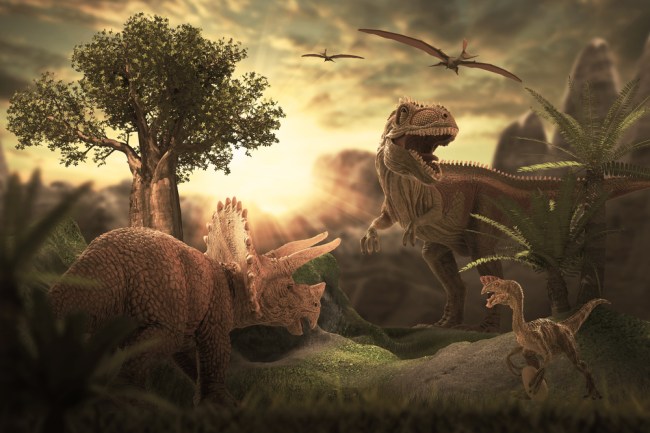
Shutterstock
Your home might be a Cryolophosaurus nest full of eggs of baby dinosaurs had the world-altering asteroid smashed into over 80% of the Earth. The 7.5-mile-wide asteroid struck a powderkeg and ignited a multi-year winter that caused the dinosaurs to go extinct. Scientists believe that had the asteroid smashed into nearly anywhere else on the planet there would be to this day Therizinosaurus, Gryposaurus, Epidexipteryx, Majungasaurus, Tanystropheus, and Spinosaurus roaming the Earth.
The dinosaur-killing asteroid slammed into Earth 66 million years ago and the force of 10 billion nuclear bombs was released. The devastating asteroid collided into a sloping continental shelf, just off the coast of what is now the Yucatan Peninsula in Mexico. The cataclysmic collision crashed into the shallow ocean near what is now the town of Chicxulub, Mexico. A new report states that the dinosaurs were extremely unlucky and only 13% of the Earth’s surface had the right factors to cause mass extinction. What’s unlucky for the dinosaurs was truly lucky for us mammals.
The scientific paper was published last week in Scientific Reports, where lead author Kunio Kaiho and colleagues argue that dinosaurs might still be alive today had the asteroid hit another place on Earth. The researchers believe that the asteroid’s extraordinary force combined with striking oil-rich sedimentary rocks expelled approximately 1.7 billion tons of fine-particle black carbon into the atmosphere. That powdery soot, which was enough to fill Yankee Stadium, covered the sky and blocked the sun causing temperatures to drop 18 to 29 degrees over land. These chilly conditions would have made plants and food scarce, killing off all non-avian dinosaurs.
“Though rain would have quickly washed most of the low-drifting soot from the sky, about 385 million tons would have remained circulating high in the atmosphere, blotting out life-giving sunlight,” National Geographic explains.
Kaiho examined post-impact soot in rock layers around the world and found that soot from samples taken in Haiti, close to the Chicxulub impact crater and only 400 miles away, resembles soot samples from Spain, thousands of miles away. “The [similarities] indicate a single source of the soot, which suggests that it was sourced from the target rocks of the Chicxulub asteroid impact,” Kaiho says. “The amount of hydrocarbon in sedimentary rocks at the impact site could have decided cooling levels across land and ocean.” He found enough soot that it disputes an earlier theory that there were widespread wildfires caused by superheated rock falling back to Earth following the impact of the asteroid. Kaiho said that “asteroid-generated soot would not have been evenly distributed, which fits with data that suggests the Northern Hemisphere experienced more severe cooling, while the planet’s southern half recovered sooner.”
In another scientific study published last week, geophysicist Sean Gulick and scientist Joanna Morgan dispute that it was not soot that was released but rather vaporized sulfur. The duo who study the Chicxulub impact crater said that the impact likely released around 325 gigatons of sulfur, which is more than enough to decrease worldwide temperatures. “I agree with the concept that location matters when you think of an asteroid strike,” Gulick says. “It’s hard to create a global level extinction event without it being related to the climate.” Gulick argues that he has found no evidence of hydrocarbon deposits in drill sites near the crater. “I fall on the side that it’s not a singular thing,” he said. “There’s a huge range of possibilities that we’re testing and I don’t think it was a single punch.”
More papers, many of them delving into the geology of the mass extinction, are expected to be released in the coming month, which may shed a light on how the dinosaurs died off. What do you think killed off the dinosaurs and 75% of life on Earth 66 million years ago?
[NatGeo]